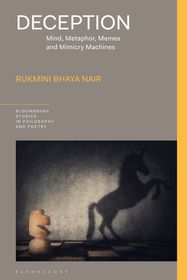
Deception
Mind, Metaphor, Memes, and Mimicry Machines
Series: Bloomsbury Studies in Philosophy and Poetry;
- Publisher's listprice GBP 85.00
-
40 608 Ft (38 675 Ft + 5% VAT)
The price is estimated because at the time of ordering we do not know what conversion rates will apply to HUF / product currency when the book arrives. In case HUF is weaker, the price increases slightly, in case HUF is stronger, the price goes lower slightly.
- Discount 13% (cc. 5 279 Ft off)
- Discounted price 35 330 Ft (33 647 Ft + 5% VAT)
Subcribe now and take benefit of a favourable price.
Subscribe
40 608 Ft

Availability
Not yet published.
Why don't you give exact delivery time?
Delivery time is estimated on our previous experiences. We give estimations only, because we order from outside Hungary, and the delivery time mainly depends on how quickly the publisher supplies the book. Faster or slower deliveries both happen, but we do our best to supply as quickly as possible.
Product details:
- Publisher Bloomsbury Publishing (UK)
- Date of Publication 11 December 2025
- Number of Volumes Hardback
- ISBN 9781350466579
- Binding Hardback
- No. of pages304 pages
- Size 234x156 mm
- Language English
- Illustrations 15 bw illus 700
Categories
Short description:
Argues that lying is fundamental to the survival of the human species, through a series of philosophical, psychological and cultural examples spanning different traditions and disciplines.
MoreLong description:
Deception challenges readers to think about their own lies - from their first lies in childhood to the clever, provocative ones they told just recently. Scouring a number of texts in philosophy, poetics, literature and theory, both western and eastern, the book urges that, at a time when phrases like 'fake news' 'gaslighting' and 'false narratives' have become an intrinsic part of global vocabulary, an interdisciplinary discussion on the intertwined future of the twins 'lying' and 'truth-telling' is an urgent imperative.
Rukmini Bhaya Nair explores the distinction between lies, metaphor and narrative performativity, presenting them as part of an interactive continuum informing how cultures engage with the concept of truth. With an engaging intellectual energy, Nair's discussion traverses an impressive diversity of writers and thinkers including Paul Grice, Ludwig Wittgenstein, Paul De Man, Noam Chomsky, the Natyashastra of Bharata, Sylvia Plath and Salman Rushdie. She argues that literary texts permit a re-evaluation of truth-telling conventions and offer a space to theorize and understand crises and problems in the world. Augmenting observations on philosophy, fiction, poetry and literary theory with scholarship in cognitive linguistics, the book shows how metaphors, fictions, and lies can function as potent cognitive stimulants.
Deception lays the groundwork for a truly inter-disciplinary account of lying as a deep-rooted form of linguistic behavior, which will appeal to anyone interested in research on developmental psychology, philosophy of language, literary and cultural studies, and linguistics.
Table of Contents:
List of Figures
List of Tables
Acknowledgements
Introduction: The Logic of the Lie
1. Figuring It Out: A Typology of Lies
2. Pretending Versus Lying: Imponderable Evidence and Lie Detection
3. Attempting to Mean: Embodiment and Bilingual Children's Use of Figurative Language
4. Transforming the Tree: Metaphor as an Organizing Device in Disciplinary Discourse
5. Creating Codes: Cross-Cultural Approaches to Deception as Performance
6. Dreamworking: Experiments with Truth in Colonial & Postcolonial Literature
7. Rewarding Risks: Narrative, Memes, Mimicry, Truth and Lies
8. Chatting with Machines: The Evolution of Deception
Conclusion: The Future of the Lie
References
Index




